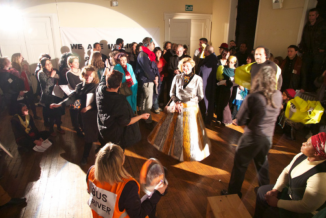These ‘studies’ build on the history of the Serpentine’s work in the neighbourhood through Dis-Assembly, an investigation between artists, students and teachers into the life of an experimental school in the process of becoming decommissioned. The Centre for Possible Studies is a convergence point in which artists, neighbourhood residents and workers and scholars might collaborate on studies born of a kind of thinking in and with the complex conditions and transactions of the road.
We are led to the idea of ‘studies’ through the histories of the Edgware Road itself. Echoes of the experimental, collaborative and participatory ‘study’ in Marie Paneth’s 1940s, Branch Street , a vivid set of reflections on her artistic work with a group of children attending a London play centre during the Second World War, offer a way of understanding how a ‘study’ can function as both a mode of artistic and knowledge production as well as an exercise of self and group reflection on the ethical, class and power configurations of its conditions. Building on this study, which became a classic in the field of British social work, in the 1960s, sociologists George Groetschius (involved in the formation of the English Stage Company and the Free Cinema group) and Joan Tash developed a ground-breaking approach to experimental community development, authoring such books as Working with Community Groups (1969) from their engagements with young people in the Edgware Road. Based out of a free coffee stall in the market, Tash and Groetschius developed a field of research whose questions and approaches were driven by the many ‘unattached’ young people of the Edgware Road they encountered. Such informal and neighbourhood research taking place up and down the Road: history groups, informal music ensembles, language classes, reading groups in the local cafes, research seminars all take place alongside the more formal research commissions of councils, developers and residents associations working on Edgware Road’s action plan.
Where some research Centres depart from a fixed idea of knowledge, of what has to be learned and taught, the Centre for Possible Studies is derived from encounters: between artists, local people, university researchers and workers, those moving to, from and along the Edgware Road. This approach echoes the pedagogical experiments of project partners at the Townhouse Gallery in Cairo and Ashkal Alwan in Beirut. In each of these projects, the opening up of political dynamics in the local is contextualized by a series of global comings and goings, producing active cartographies, subversive diplomacies and imaginative modes of exchange.
The Centre for Possible Studies is currently based at 21 Gloucester Place. The Edgware Road Project will culminate in a series of public performances, exhibitions and publications.

